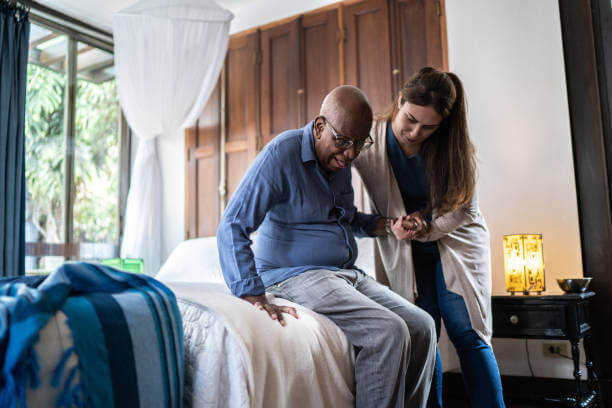Senior caregiving has become an industry segment, with professional in-home senior care service companies growing by more than 40% since 2008. This comes as no surprise because the number of seniors continues to grow with the post-World War II Baby Boomers aging and living longer than any generation before them. This leads to one job description within the senior care industry which has exceptional career growth and high demand for more workers: C.N.A. or Certified Nursing Assistant.
What is a C.N.A.?
A Certified Nursing Assistant has professional training to provide hands-on assistance with the Activities of Daily Living (ADL’s) and to monitor and record health care issues, such as vital signs and meals eaten. A C.N.A. may also be called a nursing aide. Many people consider them nurses and just use the term nurse to also mean a C.N.A. This is an important reminder that C.N.A.’s works as part of the care team. All Registered Nurses actually receive C.N.A. training during nursing school and many R.N.’s work as C.N.A.’s while they are in nursing school or during summer and winter breaks from nursing school.
What are the C.N.A. School Admission Requirements?
High-School Diploma or G.E.D.
C.N.A. Training: The First Step in Becoming a C.N.A.
Certified Nursing Assistant training was created more than 35 years ago when Genevieve Gipson, a Registered Nurse working in Ohio, decided care would be better of nursing assistants had consistent training. As patient care needs can vary in a hospital and nursing home, she found it extra difficult to not know what type of training a nursing assistant already had when care began. She pulled together a team and eventually Congress passed legislation for C.N.A. training to be required in every state nationwide. In addition, each state would need to manage the certification process by having nursing assistants pass a state exam to be certified as a nursing assistant after attending a state-approved C.N.A. training program. Many states require a minimum of 120 hours of training but some states, such as California, require 150 hours of training to become a C.N.A.
Find a C.N.A. school in your state and review their costs and requirements in Caregiverlist’s C.N.A. School Directory.
Here are some examples of C.N.A. School costs, length of programs to give you a quick snapshot:
| Name of C.N.A. School | Cost | Length |
| Malcolm-X College in Chicago, IL | $900.00 | 8 Weeks |
| Florida Educational Institute in Miami, FL | $500.00 | 8 Weeks |
| Premier Choice Health Service in Columbus, OH | $400.00 | 2 Weeks |
| Sterling Health Careers in Houston, TX | $800.00 | 4 Weeks |
| Phoenix College in Phoenix, AZ | $1,069.00 | 10 Weeks |
| Healthcare Academy of California, San Diego, CA | $1,700.00 | 3 Weeks |
| Pasadena College of Health, Pasadena, CA | $1,200.00 | 4 Weeks |
| SacMed Training, Sacramento, CA | $1,000.00 | 4 Weeks |
| Apollo, Portland, OR | $1,000.00 | 4 Weeks |
| Blackhawk Technical College, Janesville, WI | $947.00 | 4 Weeks |
As you can see, most C.N.A. Schools cost around $1,000 and provide training for one month, with additional ‘In-service” training which means you’ll work side-by-side another experienced C.N.A. at a hospital or nursing home. Financial aide in the form of scholarships and grants are often available and sometimes employers will also pay for the nursing aide training. Remember, the length of the nursing aide training program depends on if classes are offered part-time or full-time and the costs will vary slightly, too, depending on if the school is public or private. Community college programs usually cost less if they receive state funding to offer the nursing assistant training program. Always talk to a school admissions counselor for guidance and assistance with financial aide options.
Learn more about the certified nursing aide job description, take a practice C.N.A. test and apply for a companion caregiving job to gain experience working in the senior care industry – an industry predicted to be the top industry for jobs in the next decade. Caregiverlist’s job application allows you to reach multiple employers in your area, as hiring continues to be on-going since seniors may need immediate care upon hospital discharge after a stroke or hip-replacement or diagnosis with memory loss. You may also obtain professional caregiver training through an online training course to learn basic caregiving skills before you start your C.N.A. training program.

Become a C.N.A. (Certified Nursing Aide) by attending a C.N.A. School







